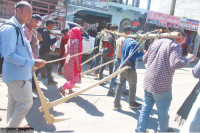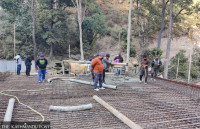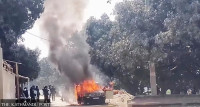National
Conservationists term nighttime Jeep safari in Chitwan National Park a wild and absurd idea
Local tourism entrepreneurs are planning to operate nighttime safari along the 34-km Sauraha-Lothar section.
Chandan Kumar Mandal
Conservationists have rebuffed the proposal by local hoteliers and safari service providers to operate nighttime jeep safari in the buffer zone areas of Chitwan National Park as a wild and absurd idea, saying such a move will hugely affect the wellbeing of wildlife.
According to reports, the Chitwan chapter of the Regional Hotel Association Nepal, safari service operators and local community forest user groups are gearing up to start nighttime jeep safari along the 34-km stretch of the park buffer zone, which is known across the world as a hotspot for valuable wild animals.
Vehicular movements will hugely impact animals like royal Bengal tiger, rhino, leopard and other small mammals and reptiles, according to Raju Acharya, a wildlife conservationist.
“Wildlife inside and around the Chitwan National Park are already disturbed during daytime due to jeep safari and other movements. Daytime jeep safari is understandable for livelihood and income generation reasons,” said Acharya, who is also the executive director of Friend of Nature Nepal, a youth-led non-governmental organisation working in the field of environment and wildlife conservation. “There are animals like tiger, leopard, civet and other nocturnal mammals which only come out during nighttime. Nighttime safari will disturb these animals.”
The nighttime safari plan follows the much-criticised government plan of introducing tourism activities inside the Shivapuri Nagarjun National Park and promoting hyper commercialisation of other protected areas across the country.
The hotel association, however, appeared unfazed.
“The route [for nighttime safari] has already been identified after a field trip,” said Deepak Bhattarai, president of the Regional Hotel Association Nepal, Chitwan chapter.
As per the plan, the nighttime jeep safari will start from Sauraha, one of the tourist hubs of the country, and end at Lothar, after passing via Kumroj Buffer Zone Community Forest.
“After Tihar, we will take all the stakeholders on a field trip along the area to assess the possibility of the safari, security and legal aspects,” Bhattarai told the Post. “We will not begin the proposed safari disturbing wildlife.”
There have been some rounds of discussions about opening new jungle safari among all the stakeholders including the officials from Chitwan National Park, according to Bhattarai.
Earlier too, discussions were held over allowing nighttime jeep safari inside the park’s core area. But this was not approved by the park authority, according to Gopal Ghimire, an information officer at the protected area.
“The new proposed route is outside the core area of the park, but it’s the park authority that will take a final decision after discussing its possibility and the impacts it can make on wildlife and local environment,” said Ghimire. “Animals mostly move around during the night. We should not disturb them during the night, as safaris conducted now are already disturbing them during the day.”
Jeep safari is already operating inside the core area of Chitwan National Park, which is one of the most popular national parks among domestic and outside tourists. Local entrepreneurs are offering similar jeep safaris in the buffer zone areas during the daytime.
According to Ganesh Kumar Shrestha, chairperson of Kumroj Buffer zone Community Forest, around 100 trips of jeep safaris take place on weekends whereas 50-60 such trips are made by vehicles along the same route during daytime safaris.
Shrestha said the community forest and buffer zone offer frequent sightings of wildlife, but he refused to admit that wildlife will be affected by nighttime safaris which will need around four hours to complete.
“Such nighttime safaris will rather protect these wild animals from potential poachers as there will be security forces as well, “said Shrestha. “In the beginning, we will experiment with only around 10 jeeps. The trip will only take two-hours inside the buffer zone and will return via another route.”
However, conservationists like Acharya feel that nighttime vehicular movement through the areas where the presence of wildlife is high not only threatens animals but also the visitors.
“Just because there are tourists does not mean we can operate 24-hour jeep safari. Rhinos and other animals can be seen during daytime as well,” said Acharya. “Wildlife-human encounter can cause more damage. What happens if a tiger attacks tourists at midnight as those jeeps are also not very safe?”




 9.17°C Kathmandu
9.17°C Kathmandu













